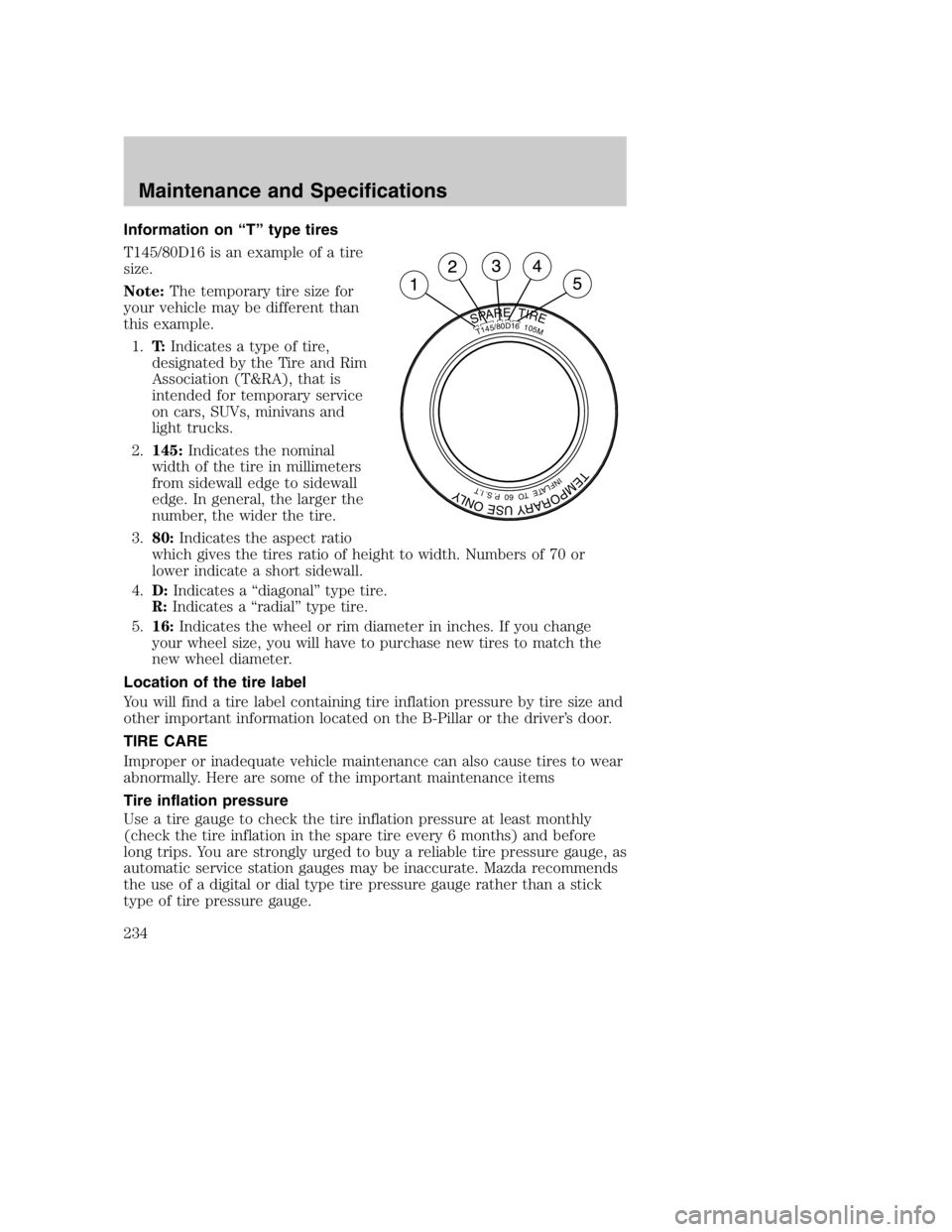Page 150 of 256

It is not recommended that the vehicle be operated in 4WD modes with
a “temporary” (i.e. dissimilar size) spare. If 4WD operation is necessary,
do not operate above speeds of 16 km/h (10 mph) or for distances above
80 km (50 miles).WARNING: If you use the temporary spare tire continuously or
do not follow these precautions, the tire could fail, causing you
to lose control of the vehicle, possibly injuring yourself or
others.
When driving with the temporary spare tire do not:
• exceed 80 km/h (50 mph) or drive further than 3,200 km (2,000
miles) total under any circumstances
• load the vehicle beyond maximum vehicle load rating listed on the
Safety Compliance Label
• tow a trailer
• use more than one temporary spare tire at a time
Use of a temporary spare tire at any one wheel location can lead to
impairment of the following:
• Handling, stability and braking performance
• Comfort and noise
• Ground clearance and parking at curbs
• Winter driving capability
Conventional spare tire information (if equipped)
If you have the conventional spare tire, you can use it as a spare or a
regular tire. The spare is identical to the other tires on your vehicle,
although the wheel may not match.
Location of the spare tire and tools
The spare tire and tools for your vehicle are stowed in the following
locations:
2004 Mazda B Series (mbs)
Owners Guide (post-2002-fmt)
USA English (fus)
Roadside Emergencies
150
Page 151 of 256
ToolLocation
Spare tire Under the vehicle, just forward of
the rear bumper
Jack, jack handle, wheel nut wrench Regular Cab: behind seats and
underneath the jack and tools
cover
Cab Plus: stowed in the passenger
side rear cab compartment or
behind the jump seat in a separate
tool bag
Cab Plus 4–Door: stowed behind
the front seats, between jump
seats and underneath jack and
tools cover.
Key, spare tire lock (if equipped) In the glove box
Removing the spare tire 1. Assemble the jack handle to the lug wrench as shown in the illustrations.
When connecting the jack handle, assemble the following:
• one handle extension and one
typical extension. To assemble,
slide parts together. To
disconnect, depress button and
pull apart.
• one wheel nut wrench. Depress
button and slide together.
2004 Mazda B Series (mbs)
Owners Guide (post-2002-fmt)
USA English (fus)
Roadside Emergencies
151
Page 188 of 256

•Check lap/shoulder belts and seat latches for wear and function.
• Check air pressure in spare tire.
• Check windshield washer spray and wiper operation. Clean wiper
blades with clean cloth dampened with washer fluid.
• Check safety warning lamps (brake, ABS, air bag, safety belt) for
operation.
• Check cooling system fluid level and verify coolant specific gravity is
correct for summer or winter conditions.
• Check battery water level (non-maintenance free).
• Check battery connections and clean if necessary.
SERVICE RECOMMENDATIONS
To help you service your vehicle:
• We highlight do-it-yourself items in the engine compartment for easy
location.
• We provide a Scheduled Maintenance section which makes tracking
routine service easy.
If your vehicle requires professional service, your dealership can provide
necessary parts and service. Check your “Warranty Information” to find
out which parts and services are covered.
Use only recommended fuels, lubricants, fluids and service parts
conforming to specifications. Genuine Mazda parts are designed and built
to provide the best performance in your vehicle.
PRECAUTIONS WHEN SERVICING YOUR VEHICLE
• Do not work on a hot engine.
• Make sure that nothing gets caught in moving parts.
• Do not work on a vehicle with the engine running in an enclosed
space, unless you are sure you have enough ventilation.
• Keep all open flames and other lit material away from the battery and
all fuel related parts.
2004 Mazda B Series (mbs)
Owners Guide (post-2002-fmt)
USA English (fus)
Maintenance and Specifications
188
Page 234 of 256

Information on “T” type tires
T145/80D16 is an example of a tire
size.
Note:The temporary tire size for
your vehicle may be different than
this example.
1. T:Indicates a type of tire,
designated by the Tire and Rim
Association (T&RA), that is
intended for temporary service
on cars, SUVs, minivans and
light trucks.
2. 145: Indicates the nominal
width of the tire in millimeters
from sidewall edge to sidewall
edge. In general, the larger the
number, the wider the tire.
3. 80: Indicates the aspect ratio
which gives the tires ratio of height to width. Numbers of 70 or
lower indicate a short sidewall.
4. D: Indicates a “diagonal” type tire.
R: Indicates a “radial” type tire.
5. 16: Indicates the wheel or rim diameter in inches. If you change
your wheel size, you will have to purchase new tires to match the
new wheel diameter.
Location of the tire label
You will find a tire label containing tire inflation pressure by tire size and
other important information located on the B-Pillar or the driver’s door.
TIRE CARE
Improper or inadequate vehicle maintenance can also cause tires to wear
abnormally. Here are some of the important maintenance items
Tire inflation pressure
Use a tire gauge to check the tire inflation pressure at least monthly
(check the tire inflation in the spare tire every 6 months) and before
long trips. You are strongly urged to buy a reliable tire pressure gauge, as
automatic service station gauges may be inaccurate. Mazda recommends
the use of a digital or dial type tire pressure gauge rather than a stick
type of tire pressure gauge.
SPARETIRE
TEMPORARYUSEONLY
INFLATETO60P.S.I.T
T145/80D16105M
2004 Mazda B Series (mbs)
Owners Guide (post-2002-fmt)
USA English (fus)
Maintenance and Specifications
234